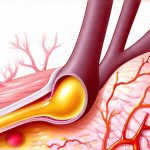Gastroesophageal reflux disease (GERD) is a common condition affecting millions of people worldwide. It occurs when stomach acid frequently flows back into the esophagus – the tube connecting your mouth to your stomach. This backflow, known as acid reflux, can irritate the lining of your esophagus and cause a range of uncomfortable symptoms. While occasional heartburn is normal, frequent or severe acid reflux may indicate GERD requiring medical attention.
Understanding the common signs and symptoms of GERD, along with recognizing when it’s necessary to consult a healthcare professional, is crucial for managing this condition and preventing potential complications. This article will explore these aspects in detail, offering insights into recognizing the nuances between typical discomfort and indicators that warrant further evaluation.
Understanding GERD Symptoms
GERD manifests differently from person to person. Some individuals experience classic heartburn, while others may present with less obvious symptoms. The severity can also vary greatly, ranging from mild, occasional discomfort to more persistent and debilitating issues. Recognizing these variations is the first step toward appropriate management. It’s important to remember that symptom presentation doesn’t always correlate with the presence of esophageal damage; some people experience significant symptoms with minimal damage, while others have substantial damage with few noticeable symptoms.
Less Common Manifestations
While heartburn and regurgitation are most commonly associated with GERD, it can also present in atypical ways. These less common symptoms sometimes make diagnosis more challenging as they may be mistaken for other conditions. Recognizing these alternative presentations allows for broader consideration when evaluating potential GERD-related issues.
Atypical Chest Pain
Sometimes, the pain associated with acid reflux can mimic heart attack symptoms. This is particularly concerning because it can cause anxiety and lead individuals to seek emergency care unnecessarily. The key difference often lies in the nature of the pain; heartburn-related chest pain is typically described as burning or acidic, and may worsen after eating or when lying down. However, due to the potential for overlap with cardiac symptoms, any new onset of chest pain should always be evaluated by a medical professional to rule out serious heart conditions first.
Chronic Cough & Hoarseness
Persistent cough, especially at night, can sometimes be linked to GERD. Stomach acid that reaches the esophagus can irritate the airways, triggering a chronic cough reflex. Similarly, acid reflux can lead to hoarseness or a persistent sore throat as it irritates the vocal cords. These symptoms might be mistaken for allergies or upper respiratory infections, leading to delayed diagnosis of underlying GERD. Identifying these connections is vital for accurate treatment plans.
Difficulty Swallowing (Dysphagia) & Globus Sensation
Difficulty swallowing, known as dysphagia, can occur if chronic acid reflux causes narrowing in the esophagus. This narrowing makes it harder for food to pass through. Another related sensation is globus, which feels like a lump in the throat even when nothing is there. These symptoms should prompt medical evaluation as they indicate more significant esophageal involvement and potential complications from long-term GERD.
When Should You See a Doctor?
While occasional heartburn can usually be managed with over-the-counter remedies, certain situations warrant medical attention. If you experience frequent heartburn – defined as occurring two or more times per week – it’s time to consult a healthcare professional. Similarly, if over-the-counter medications provide little or no relief, seeking medical evaluation is crucial. Other red flags include difficulty swallowing, persistent vomiting, unintended weight loss, black or bloody stools (indicating potential bleeding in the digestive tract), and chest pain that’s severe or doesn’t respond to typical heart attack treatments after appropriate assessment. These symptoms could indicate more serious complications of GERD or an entirely different underlying condition requiring prompt diagnosis and treatment. Don’t hesitate to seek professional guidance if you are concerned about your symptoms or suspect you may have GERD, especially if they are interfering with your daily life. Early intervention can prevent the progression of the disease and improve overall well-being.


















